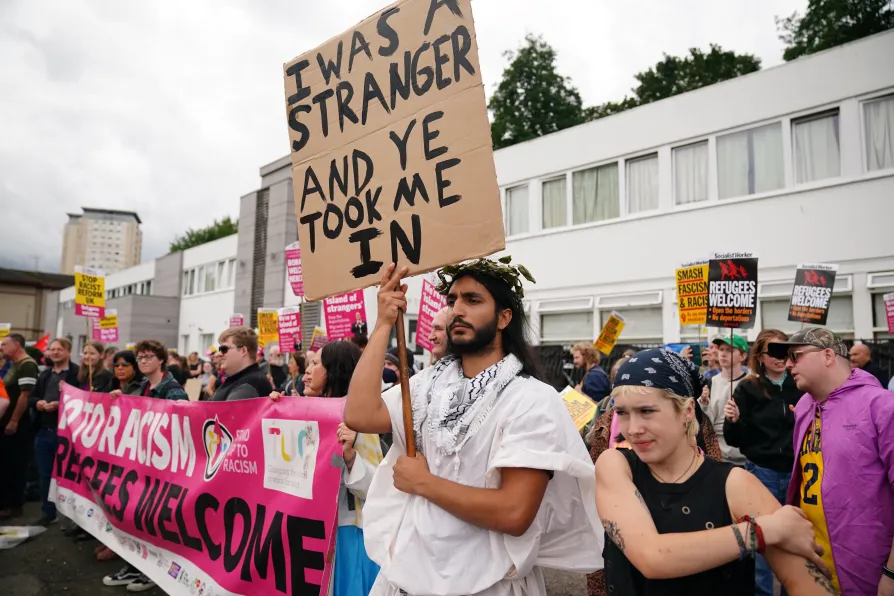
 People take part in a Stand Up To Racism counter protest outside the Cladhan Hotel in Falkirk, August 30, 2025
People take part in a Stand Up To Racism counter protest outside the Cladhan Hotel in Falkirk, August 30, 2025
THE Trades Union Congress meets in the shadow of national and international crises.
A lot rests on whether the working-class movement can intervene to shape their resolution.
In our new world disorder Donald Trump, heading a superpower to which Britain is bound in a deeply unequal alliance, heaps contempt on international law and endorses land theft and ethnic cleansing.
Our government fawns on Trump and actively support Israel’s race war. That doesn’t stop the same US administration coddling the British far right, feting Reform UK leader Nigel Farage in Washington or having him to breakfast with Vice-President JD Vance in a Cotswold manor.
That far right has been making the political weather, terrifying vulnerable refugees with hostile mobilisations outside hotels and hoisting or painting England flags in public places with the clear aim of exclusion and intimidation.
There is no evidence these stunts speak for majority opinion, nor has the right mobilised on anywhere near the scale of the huge Palestine solidarity movement, which marches again in London this weekend.
But political impact depends on more than numbers. The monopoly media that downplays or demonises the Palestine marches laps up the hotel rallies.
The Home Secretary whose absurd ban on Palestine Action has prompted some of the largest mass arrests in British history races to associate herself with the flag campaign, claiming in a cringeworthy interview not only to be drowning in patriotic kitsch at home but that climbing up motorway gantries to put flags up is perfectly normal — “oh, put them up anywhere.”
The Guardian’s longtime economics editor Larry Elliott has observed that unlike the right, the British left often fails to scent opportunity in crisis.
Brexit, a public rejection of the globalised capitalism socialists had always opposed, became a self-inflicted disaster exposing the gulf between millions of working-class people and their supposed representatives.
Covid, whose heroes were “key workers” of the hospital or shop floor, driving our buses or cleaning our streets, morphed into a prolonged inflationary crisis further enriching the rich and impoverishing the rest.
Unions mounted an impressive strike wave in response, winning real deals for workers — but the failure to prevent Labour repudiating any transformational vision at the same time, or its left being cut to pieces, meant these never translated into wider economic change.
If the left is to take the wind out of the right’s sails, we need a militant labour movement uncompromising both on its interests and its principles.
The left can take the political initiative, and did at the height of Corbyn’s Labour leadership, when the Tories were forced to disown austerity and U-turn on shutting out child refugees, and a home secretary had to resign because of public uproar over racist deportations.
Working-class interests are only dimly reflected in government manoeuvres. Angela Rayner’s fall, while self-inflicted, probably strengthens enemies of the Employment Rights Bill at Westminster, but the reshuffle shows no change of direction.
That should inform union approaches to a looming deputy leadership contest, where the bar for entry has been raised to exclude the left but union influence should be brought to bear on MPs to counter that.
But with hundreds of thousands showing interest in a new left party, and a marked leftward turn by the Greens, Labour needs to know it’s not the only game in town.
Unions are essential to a sustained anti-racist strategy that unites workplaces and communities to fight for their collective interests and exposes far-right lies; to a high-profile, national fight for public ownership and proper jobs to end the long decline in living standards; and to overturning the bans and arrests through which an unpopular government tries to smash the peace movement.
If we cannot unite with all forces to do that, the right will continue to win support for poisonous, anti-democratic answers to Britain’s systemic crisis. And the hour grows late.










